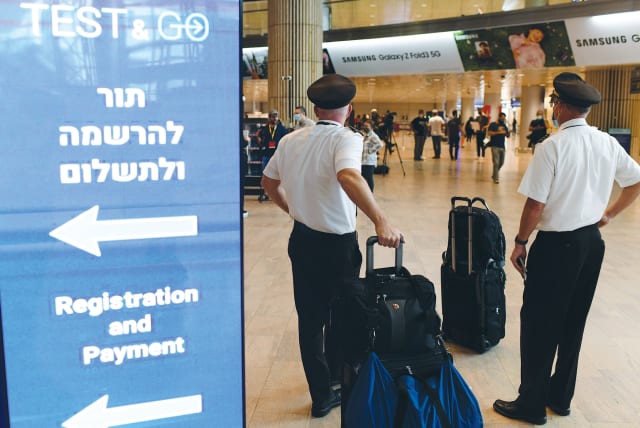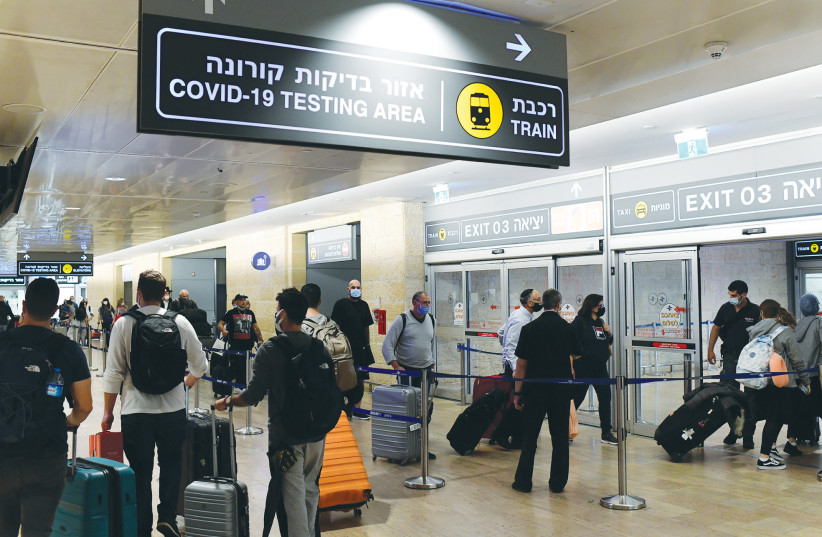Time to create pandemic travel exceptions rule - opinion

The mechanism utilized at the start of the pandemic to address outbreaks and most recently in this fifth Omicron wave must change.
In February 2020 the Government of Israel – as did many governments around the world – began implementing a number of measures to address the COVID-19 pandemic including those directed at the entry and exit of people to and from the country. These measures affected the lives of all Israelis and of global Jewry.
In particular, they adversely affected new immigrants to Israel – olim – who by definition leave loved ones behind to realize vision and dream. They become a live bridge to families and communities they left behind, generating uniquely difficult, long-lasting challenges. This reality includes recurrent decisions related to opening and closing of the airport and travel requirements for Israelis and foreigners seeking entry to visit, celebrate, mourn or assist family members during milestone moments and urgent times of need.
To address rising needs and implications, an exceptions mechanism was instated, changing often to reflect sky closures and openings as the pandemic waxed and waned. A timeline documenting entry/exit policies for both Israelis and foreigners, demonstrates the frequent (on average monthly) and cyclical changes.
Two years into a global pandemic, it is time to shift gears and create a new paradigm, guided by a proactive, systemic approach that will inform and create a holistic, clear and transparent policy. It is imperative to create the “rule” to the exceptions, in order to address the long-term ongoing nature of the COVID-19 reality and its implications on Israel’s citizens, on olim and on vital relations with global Jewry, prospectively rather than retroactively.
The mechanism utilized at the start of the pandemic to address outbreaks and most recently in this fifth Omicron wave must change. Though it appears skies will once again gradually open resolving immediate needs, significant systemic issues remain and are exacerbated, as time and corona fatigue factor in.
Documentation of the recurring, accordion-like expansion and reduction of exceptions indicates that each time an outright ban is implemented, little by little, the same exceptions to the ban are added shortly thereafter, and that the system is eliminated a few weeks later, creating confusion, frustration and uncertainty (for example, in the case of olim giving birth). While widespread and dramatic decisions regarding the entry/exit of individuals to and from Israel was initially described and accepted as emergency procedures, the fact that the pandemic has lasted for nearly two years, coupled with the realization that this has not generated a holistic, clear, transparent policy and implementation – reflecting proactive forethought and planning – has led to significant and recently very vocal, local and global, discontent.
Without a doubt, sky closures and travel bans have been particularly difficult for Israeli citizens, many of them olim, who by definition live in Israel and have significant ties to their country of origin – whether familial, communal, or professional. Eliminating the ability for citizens to freely exit the country – requiring applications for permits – has resulted in significant paperwork and despite the indefatigable commitment of those processing applications, the timeframe for turnaround is often lacking for the individual seeking a travel permit, whether for personal or professional needs.
THE SAME exceptions mechanism is used for permits by foreigners seeking entry for urgent or humanitarian needs exceptions. The same issues of insufficient staffing at peaks, confusing or unclear criteria and a sense of low transparency exist throughout. This system also excludes all that is regarded as nonurgent, including unexceptional life-cycle events and the regular need to see loved ones – a basic need that over time becomes urgent – and can no longer be sustained.
In order to create the rule to the exceptions, the conversation must shift. Subject to Health Ministry guidelines and public health considerations, two years of experience indicates that possible policies could include permitting dual citizens, including olim, to exit Israel to their countries of origin, enabling them to be with family during vital times or pursue their livelihoods. As citizens who by definition have parted from loved ones when realizing personal and collective vision and mission, olim must be considered as a unique designated group. As such, immediate family members of all Israeli citizens, including olim, should be able to travel to Israel even at times when foreigners are barred from entering the country.
This does not prefer them over others, rather it levels the playing field, ensuring equality for all Israeli citizens, to have the care and support of immediate family members, acknowledging it is a basic need. Foreigners with a valid visa to be in Israel for an extended period of time (such as student visas, work visas, those attending programs like Masa, etc.) and holding all required permits and medical records should be allowed entry. An emphasis must be placed on creating mechanisms for facilitated group travel for educational purposes when possible even during times of travel restrictions, recognizing and prioritizing the singular connections forged through such trips.
Establishing the rule will significantly lower the number of exceptions demanding processing. It will enable the ministries and agencies responsible for assessing cases and providing permits to have the capacity to publish and update criteria, be adequately staffed while ensuring transparent, equal and consistent implementation and to reply within a reasonable timeframe.
The Knesset must enhance its regular oversight mechanism of the entry and exit policies via a specific committee (i.e., The Law Committee) in order to streamline monitoring and ensure fair, efficient and effective implementation. Prioritizing this issue and recognizing its significance, Israel can work with its allies to remain informed and learn from best practices regarding reuniting families while ensuring public health during times of crisis. Canada, for example, has had a successful policy enabling the entrance of first-degree family members for months. Perhaps Israel can learn from it to improve its own exception for first-degree family members.
Nearly two years into a global pandemic, having heard, felt, sounded and represented the thousands of voices of those affected directly and indirectly, informs the growing importance and urgency for a holistic, clear, transparent policy, creating a general rule rather than continued reactive exceptions. Based on accrued experience of the past two years, there are reasonable rules that can generate certainty, clarity and stability, even and especially, in an already unstable, changing reality. No less importantly, such a shift will reflect well-deserved empathy and recognition of Israeli citizens, olim, their families, and global Jewry in COVID-19 travel-related decisions and serve well in the event of future waves and/or decisions related to travel, benefiting all Israelis and the critical relationship of Israel as a nation-state, with Jews worldwide.
The author is a public policy and strategy adviser, and candidate for chairperson of the Jewish Agency. She was a member of the 23rd Knesset.
Jerusalem Post Store
`; document.getElementById("linkPremium").innerHTML = cont; var divWithLink = document.getElementById("premium-link"); if (divWithLink !== null && divWithLink !== 'undefined') { divWithLink.style.border = "solid 1px #cb0f3e"; divWithLink.style.textAlign = "center"; divWithLink.style.marginBottom = "15px"; divWithLink.style.marginTop = "15px"; divWithLink.style.width = "100%"; divWithLink.style.backgroundColor = "#122952"; divWithLink.style.color = "#ffffff"; divWithLink.style.lineHeight = "1.5"; } } (function (v, i) { });

